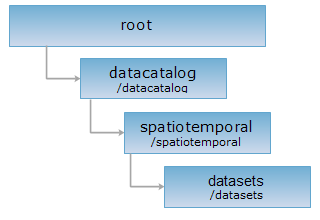
<spatiotemporal_uri>/datasets[.<format>]
The datasets resource represents a collection of all the datasets in a datasource.
Supported Methods:
Supported output formats: rjson, json, html, xml.

Implement the HTTP request on the following URI, where supermapiserver is the server name, with rjson being the output format.
http://supermapiserver:8090/iserver/services/datacatalog/rest/datacatalog/spatiotemporal/datasets.rjson
Get the information of all the datasets in a datasource.
The structure of the response resource representation after implementing the GET request on the datasets resource will be as follows:
| Field | Type | Description |
| datasetNames | List<String> | Name list of imported data. |
| datasetCount | int | Dataset count of imported data package. |
| childUriList | List<String> | URI list to visit data package. |
The returned rjson format representation after implementing the GET request on the datas resource http://supermapiserver:8090/iserver/services/datacatalog/rest/datacatalog/realtime/datasets.rjson is as follows:
{
"childUriList": ["http://supermapiserver:8090/iserver/services/datacatalog/rest/datacatalog/realtime/datasets/tuit"],
"datasetCount": 1,
"datasetNames": ["tuit"]
}
Asks for the response identical to the one that would correspond to a GET request, but without the response body. This is useful for retrieving meta-information written in response headers, without having to transport the entire content. The meta-information includes the media-type, content-encoding, transfer-encoding, content-length, etc.
HEAD request can be used to check whether the datasets resource exists, or whether the the client has the permission to access it. It can also determine if the datasets resource supports an output format <format> if performed on a URI with .<format> included.